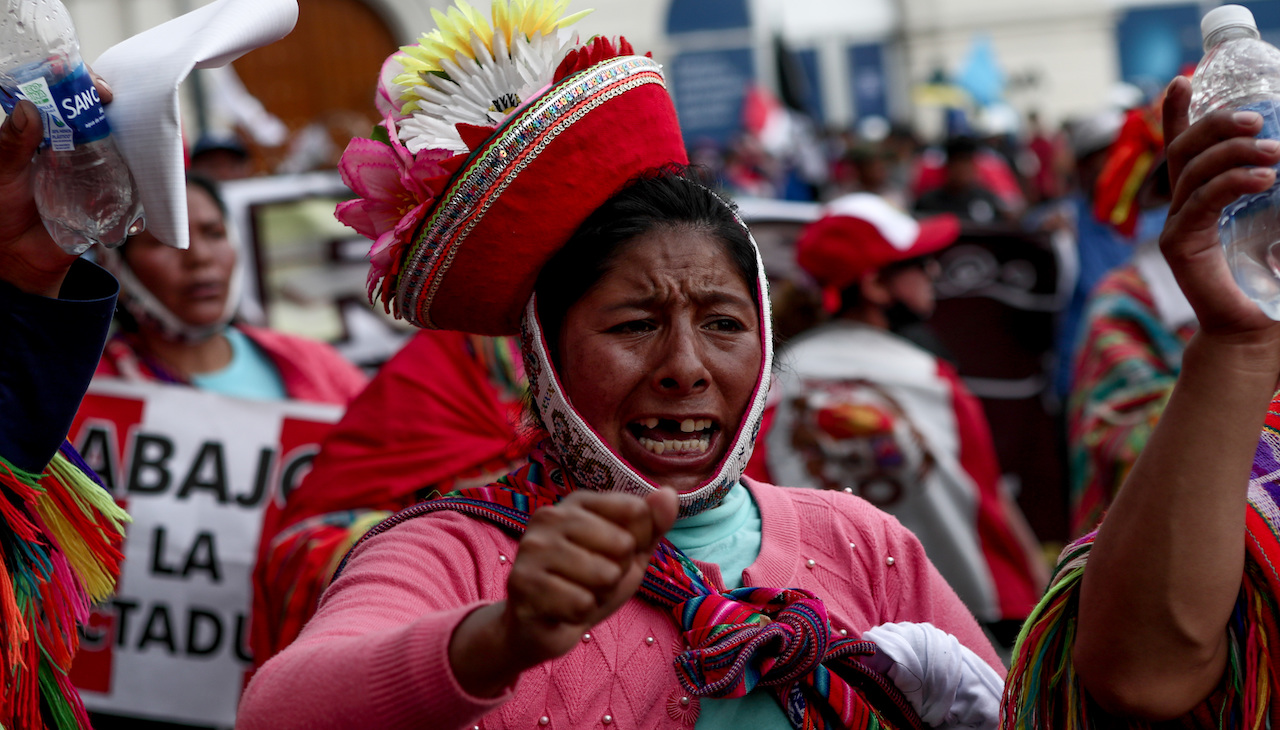
House Democrats call on Biden to stop aid to Peru amid political turmoil, protests
In a letter sent Mon., Jan. 30, Biden is urged to suspend all aid to Peru over a “pattern of repression” regarding the ongoing protests & government crackdowns.
President Joe Biden has been asked to suspend all U.S. aid to Peru in a letter penned by several House Democrats.
In the letter sent on Monday, Jan. 30 and a copy given to the Associated Press — with copies also sent to Secretary of State Antony Blinken and Secretary of Defense Lloyd Austin — 20 Democratic lawmakers urged the president to halt all aid over a “pattern of repression.”
This, of course, is regarding the ongoing political crisis in Peru where an uprising is occurring in real time, with protests that have carried on for weeks across all cities and towns that prompted the government to respond with deadly lockdowns on its citizens that have left over 50 dead.
The Peace Corps has even had to evacuate all of their volunteers.
According to the Washington Office on Latin America, the U.S. provides over $40 million annually for Peru’s security assistance, and it goes towards combating drug trafficking.
Some of the known progressives to have signed the letter are New York Rep. Alexandria Ocasio-Cortez, Rep. Pramila Jayapal of Washington, Rep. Jim McGovern of Massachusetts, a longtime advocate for human rights in Latin America, with Pennsylvania Representative Susan Wild being the organizer.
“Security forces have indiscriminately responded with almost no regard for protestors’ human rights,'' the letter read.
“Rather than working to deescalate tensions, the Boluarte government has substantially increased tensions — including classifying protesters as ‘terrorists’ and limiting citizens’ right of movement,” they added.
¿Qué pasa en Perú?
Peru’s political crisis is a result of the former President Pedro Castillo’s attempted self-coup when he tried to dissolve Congress prior to a planned impeachment vote following corruption charges, that resulted in his ousting on Dec. 7, and his arrest, for which he will serve 18 months in pre-trial detention.
Castillo’s replacement, Vice President Dina Boluarte, is the country’s sixth president in seven years.
The people of Peru’s reaction to Castillo’s arrest was anger and pain and now pressure is mounting on Boluarte — the nation’s first woman president — to resign.
The long standing political and social tensions have resulted in widespread protests across cities and towns, as well as a deadly government crackdown with no end in sight.
However, for many Peruvians, and especially those not living in the capital of Lima, have felt the lack of political representation for more than 40 years and an upheaval was imminent.
Peru has struggled to bounce back from the economic impact of the COVID-19 pandemic and lack of access to services like health care and quality education, and the country was already struggling prior to lockdown.
Peru’s recent political history
The country’s political instability first happened during the Shining Path insurgency of the 1970s and 1980s. The communist party of Peru had the goal to overthrow the government by way of guerrilla warfare and instituting a New Democracy, that was led by founder Abimael Guzmánand,
This led to a savage dictatorship under Alberto Fujimori, credited for reviving Peru’s economic engine, and now the current post-2016 presidential turmoil that has been unstable even while the country’s economic conditions improved because of natural resource cultivation like copper.
However, since 2016, no Peruvian president has finished their term, and Boluarte is not expected to complete Castillo’s unfinished term that ends in 2026.
RELATED CONTENT
She has insisted though, that she does not plan to stay in office and staying is solely her constitutional duty.
Many in Peru are fighting to put Castillo back in power, despite the attempted coup. A few Latin American leaders seem to agree, such as Mexico’s left-wing President Andrés Manuel López Obrador, who has been public about his feelings regarding seeing Castillo as Peru’s rightful president.
The Mexican President, according to reports, is even looking to offer Castillo asylum.
Global and U.S. Responses
The crisis in Peru has garnered the attention of not only Biden, but also the European Union External Action, the diplomatic service wing of the European Union, denouncing what they see as excessive force.
“The European Union deplores the very large number of casualties since the start of the protests. Peaceful social protests respecting the rule of law are legitimate in a democratic society. The EU reiterates its condemnation of the widespread acts of violence as well as the disproportionate use of force by security forces,” they said in a statement.
Biden however has expressed support for Boluarte, encouraging her to restore calm and find a political solution.
Support has also come by way of funding, with outgoing U.S. Ambassador Lisa Kenna who announced an additional $8 million for coca eradication efforts in the remote Upper Huallaga valley, which is on the slopes of the Andes in central Peru.
Kenna has also met with the defense minister and other cabinet members.
But according to the letter penned by the Democratic Representatives, actions such as those by Kenna, send an “ambiguous message,” saying the country can do a lot more.
“The U.S. government can and must do more,” they wrote. “We believe our proposed actions would send a powerful signal in support of fundamental rights and help promote effective engagement for a political resolution.”











LEAVE A COMMENT: